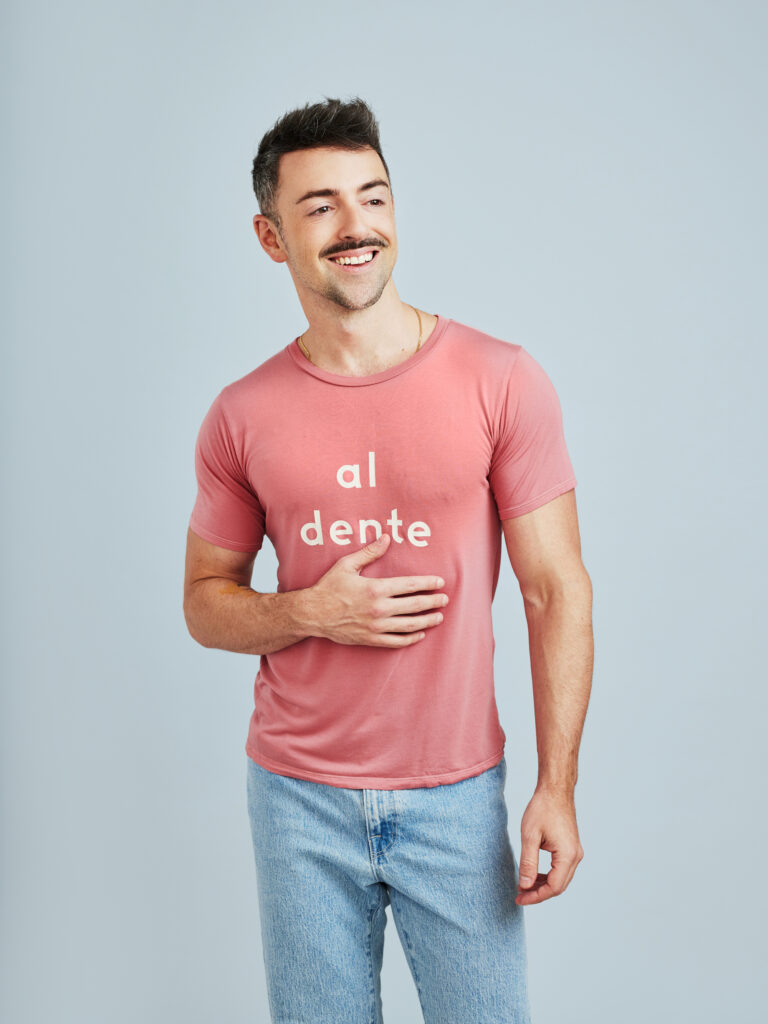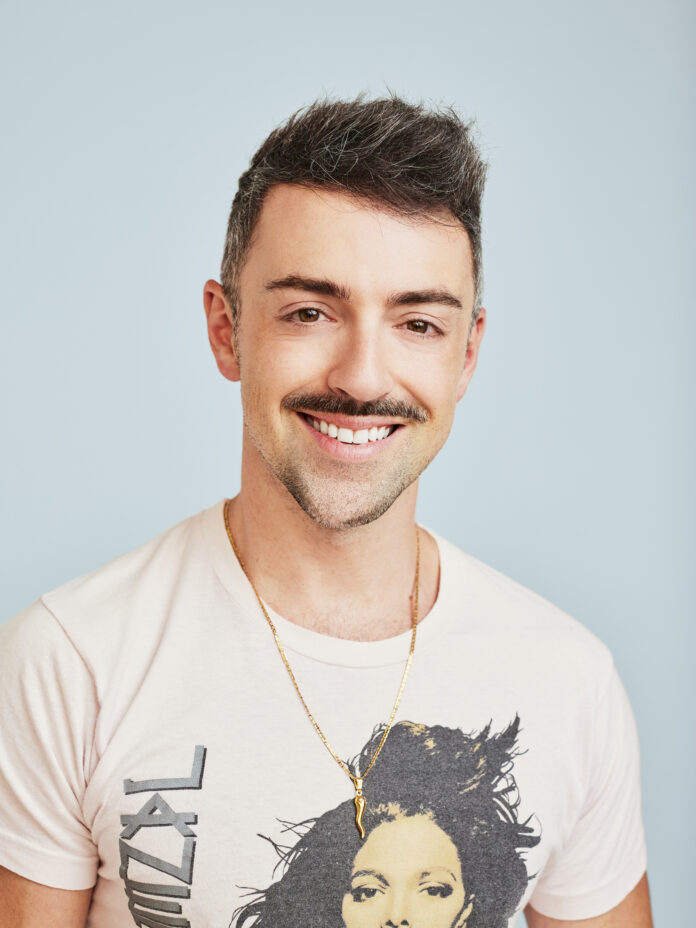There are many places where you’ve probably seen Matteo Lane — among them on Netflix’s queer comic showcase “The Comedy Lineup” and on his something-for-everyone Instagram, where he’s been wearing more shirts.
This shift happened during the pandemic. Lane tells me he decided to pull back from thirst-trap pics, at least a bit (a recent tour poster features him slurping on spaghetti sans shirt), and offer more of his comedic thoughts. On Instagram, you’ll find him doing just that on everything from a visit to the Museum of Sex in New York to making dishes featuring his Italian heritage. For instance, in one how-to video while he’s making penne alla vodka, he admits not ordering penne in Italy because the risk is too great for the word to be misheard as “pene,” which means exactly what you think it does: penis.
Here, Lane talks about touring, why the pandemic doesn’t always make for great comedic material and that time a journalist made him sound like a “depressed Fiona Apple.”
How is doing an LGBTQ+ benefit show different than a typical Matteo Lane show?
Well, for a performer, things don’t change. I have a job to do. My job is to go up and be as funny as possible for the allotted time I’m given, and I hate to say, but that’s pretty much it. That’s the benefit of working in New York for so long, in so many different types of rooms and shows and bars and basements and houses and clubs and train stations — that you have worked up enough skill to perform in any environment.
So obviously because it’s a fundraiser and it’s full of queer people, they’re not going to be hostile to me. If I was doing a fundraiser for, I don’t know, hunting, that might be different. It might be out of place and they’d be like, “Please leave.” And I’d be like, “You’re right.” But yeah, I mean, I’m happy to do anything I can to help out, and all I can really offer is my sense of humor, so hopefully it brings some joy to people.
Have you entered a room where it did feel hostile, first of all?
I’m a homosexual. Yes. Let’s start with the Catholic Church. Let’s start with locker rooms. Let’s start with school in general. So yes, I have experienced not feeling welcome.
As a comedian, though, have you been in a space that wasn’t welcoming to you?
Yes. The thing is, it’s hard to explain to people sometimes because people just don’t know. People say things to you, or don’t understand comedy or the world of comedy. It’s not like I was excited to be a comedian and then suddenly I’m performing for sold out rooms. I spent 12 years performing in literal basements with three people, places all the way in deep Brooklyn. You just perform wherever you can. Nothing glamorous really happens to you until, for me, a year ago. So yeah, there’s been so many times I’ve been on stage and people either make assumptions, or don’t like that I’m gay, or whatever. But you know what? At the end of the day, my goal is to try and bridge that gap and show them we’re more alike than we are different.

We’re living through a very polarized and divisive time, if you look at the political climate and what’s happening to drag queens. I imagine conservatives would have a lot to say about children coming to your show.
Well, I don’t want children at my show, let’s just start there. And number two, these conservative politicians, it’s the most simple, basic therapy. Obviously, no one’s mad at a drag queen reading to a child. They’re mad about something else. And I think it’s because they’re losing grip with reality, and they know that they’re losing touch, and they know they’re losing their stand in America, and this is the last attempt to try and gain some control, and have kind of a message. Because the best way to get people on your side is through fear. And so they’re trying to instill fear in people. And it’s like, well, we’ve got arms, poison, car accidents, alcohol, the Catholic Church. These things hurt kids more than a drag queen reading a kid a book about Humpty Dumpty. You know what I mean? I think the most frustrating problem is that they don’t actually care, but we are an easy target for them because they know they can instill fear into people. But I think their days are coming to an end.
It all reeks of desperation. And I also grew up Catholic, so everything you’re saying about Catholicism is extremely relatable to a young queer kid, such as myself, who grew up feeling like I had to make a choice. It was either God or being gay.
Right. Well, for priests, it’s both. By the way, I hope when you write this… I hate doing interviews because when people write stuff, I think I’m coming off funny, and then I read it, and you guys always try and make me sound way more serious than I actually am, and it ruins the vibe. So please do me a favor, and don’t make me sound like I’m proselytizing and preaching. I’m here to be a comic.
It sounds like that’s something you’re very conscious of.
Because I did an interview once, years ago, for a magazine. I was trying to be really funny, and being funny sometimes can be self-deprecating, and they twisted it on me and made it sound like I was this depressed Fiona Apple who’s trying to do comedy. And I’m like, “Wow, OK, lesson learned that not everyone has your best interests in mind when doing things.”
Does that make it difficult to talk to journalists for you? Not being able to really control the narrative?
Yeah, because it’s not really in my control. If we’re doing a TV interview, I’m fully in control. People hear how I say things, see how I say things. When people write stuff, they put their voice into [my] head, and assume how I feel, and it’s tricky.
Yeah, I get that. But I’ve been doing this for a long time, and it’s really important to me to make sure that I preserve the voice of the subject that I’m interviewing.
Gosh, the title of the article is Matteo Lane, in quotes: “I hate myself.”
You mentioned your ascension earlier. But when you look back, and you touched on this a bit, how do you reflect on your journey to getting to this place right now in your career?
I was just talking about this with my therapist today, and I’m so in the eye of the storm that I can’t quite feel it yet. I just sort of feel like I’m still working, just more. Nothing has really changed. I mean, I have better hair now. But I’m just always on planes, always in hotels, just performing. I feel like Liza Minnelli. I’m taking a break this summer, so hopefully I can reflect on the cool things I’ve done. But I’m just kind of a workhorse right now. So I haven’t really thought about it, to tell you the truth. I’m happy.
What’s your process for writing your comedy?
I write on stage, so I use the Comedy Cellar in New York to write. I can’t sit at a coffee shop and write for hours. My brain just doesn’t do that. So what I do is I have ideas and go on stage, and record myself and work them out on stage. Write with the audience. And then figure it out through repetition that way.
Are you watching the audience to see what works best?
You’re listening, yeah. If they laugh, yay.
Well, that’s the goal, right?
Evidently not every comedian’s goal, but that is my goal.
What about the material on this tour? It’s been an interesting time in the world, as we talked about, and you, like the rest of us, were in isolation for a while. Did you draw upon any of that for this show?
Yeah. I mean, you would be surprised, but when you get in front of a thousand people, they don’t want to be reminded that they were quarantined for two years. But also, too, what am I bringing to the conversation that Twitter, TikTok, Instagram, Snapchat… I have to think of things that are a little more evergreen and universal, that will last for more than just what’s happening in the now, because people made the jokes already. I talk about “Fortnite” and “Call of Duty” a lot, because that’s what I was doing the whole time I was in the pandemic, and I wrote a lot of material as a result of it. So a lot of material came from the pandemic, but it’s not an hour where I’m like, “And remember when?”
You just make a decision of where you want to go. And I mean, it’s frustrating, because we all went through some shit deep trauma for two years and we all just pretend it didn’t happen. But during the pandemic, I was doing all those park shows and rooftop shows, and I talked about it then, but then you just naturally feel that the time is up.
How do you navigate between the obvious gay thirst for you and also the interest in your actual work as a comedian?
Depends on how horny I am. I don’t know. Am I feeling lonely? Do I need to date someone? Throw up a shirtless picture, see what you can get. Pretty much it. I’m no different than any other gay. I just want attention.
I mean, to tell you the truth, I haven’t posted thirst traps regularly. I mean, I was, up until the pandemic, and then I just made the decision to start posting my material instead. I really benefited from having people appreciate me for my thoughts. I enjoy working out, and I enjoy feeling good and healthy, and I’m very proud to say I see a trainer and eat healthy. And I don’t drink, and I don’t do drugs. And that’s just sort of a life I chose.
After your Lansing show, after touring, what’s next?
Eating pasta in Italy.
What’s the Matteo Lane fan base like in Italy?
Gay, but they speak Italian.
This interview has been condensed and edited for clarity.
